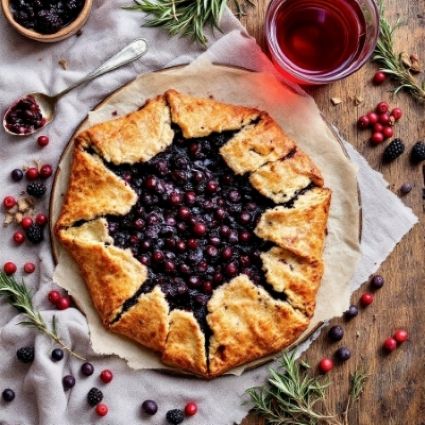
Wildcrafting: Elderberry and Chokecherry Galettes - Saturday, September 27, 2025
Saturday, September 27: We’ll begin with a guided walk around our nature center, identifying a variety of edible and non-edible berries while learning about their uses, folklore and how and when to harvest them. Then, we’ll come together to craft rustic elderberry and chokecherry galettes, blackberry chia jam, and berry-rosehip tea – a true celebration of nature’s fall bounty! To top it off, we’ll enjoy our handmade treats with a scoop of creamy vanilla ice cream. Come gather, create, and indulge in the magic of the fall wild harvest!
Volcan Mountain has a diverse abundance of blackberries, elderberries, wood strawberries, chokecherries, coffee berries, toyon berries, manzanita berries, Sierra gooseberries, all of which are important food sources for local wildlife. We will take a short walk to identify the various types of berries growing in the area and discuss which are edible, their harvesting seasons, and different ways to use them.
Due to its popularity, this workshop is also held Sunday, September 28
Date: Saturday, September 27
Time: 10:00 am - 2:00 pm. Due to the gated entry for VMF's Volcan Mountain Nature Center, please plan to arrive between 9:45 am - 9:55 am.
Cost: $35 per person. Space is limited to 12 participants.
Location: VMF's Volcan Mountain Nature Center in Julian.(22850 Volcan Road/4002 Farmer Road, Julian, CA 92036).
Wildcrafting workshops are generally held every other month on the 4th Sunday of the month from 10:00 am – 2:00 pm. Holidays might change the date of the workshops.
You may contact the VMF office with questions or for more information at 760-765-2300 or contact Janice at education@volcanmt.org.
Wildcrafting is the age-old practice of collecting or harvesting plants from their natural habitat, or “wild” habitat, for food, medicine, or craft. It applies to uncultivated plants wherever they might be found and is not necessarily limited to wilderness areas. Ethical considerations and sustainable behaviors are practiced, such as protecting endangered species and avoiding potential depletion of commonly held resources. The practice of sustainable wildcrafting requires making a commitment to develop your knowledge and connection to the natural landscape, deepen your local sense of place, and take responsibility for its regeneration for future generations. For more information, please watch VMF's 10 Best Practices for Foraging Wild, Edible Plants
To register, complete the information below and click submit. If you are registering more than one person, please return to this page and fill-out for each person you are registering before continuing to make your payment on the following page.